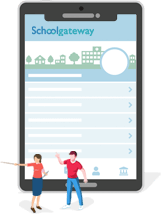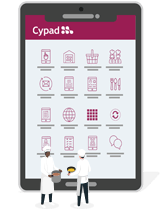The COVID-19 pandemic, lockdowns and resulting school closures have impacted everyone in one way or another. As we prepare for the return to school, communication with parents and students will continue to be critical.
Even as schools reopen, there will still be a number of restrictions in place that will complicate school life.
That’s why we’ve pulled together 8 tips to help you support your parents, students and staff as your school reopens.
Tips for supporting staff, students and parents during the return to school
1. Keep communication regular, open and two-way
Quick and clear communication is key. And while sharing important updates is essential, it’s just as important to simply reach out.
With this in mind, make an effort to check in on your students, parents and staff.
While there are many barriers to communication to contend with, try to maintain an effective two-way flow of information. This will give students, parents, and staff the confidence to raise issues. You can then fix any issues raised during the early stages, before they become larger problems.
Clearly communicate with parents and students about your plans for returning to school, including what is happening and when.
If you’re looking for a simpler way to keep parents engaged, you may want to consider a parental engagement app. School apps, such as School Gateway, allow you to connect with parents in real-time via a single login. This gives parents instant access to their child’s life at school – anytime, anywhere, in a matter of seconds.
Looking for more information on parental engagement? View our blog on Parental Engagement: Strategies for Success.
2. Keep mental health high on the list
The COVID-19 pandemic and resulting lockdowns and school closures have impacted many – most notably, children. Endeavor to do what you can to support the mental health of students, staff and parents.
Work with parents to make sure they know the signs and can recognise when their child may be struggling with their mental health.
On Monday 22nd February, Public Health England published a free 3-hour online training course called Psychological First Aid: Supporting Children and Young People. The course helps people to support children and young people’s mental health during emergencies and crisises. In particular, the COVID-19 pandemic.
The course is aimed at parents, carers, and workers, so, if possible, consider asking your staff to complete it. You could even encourage parents to take part.
According to a government statement, the training will better equip people to “identify those children that are in distress and provide support to help them feel safe, connected and able to take steps to help themselves during the pandemic or other crisis situations.”
Take additional care to monitor the mental wellbeing of staff, offering them additional resources if you can.
Try not to expect everything to go back to normal. There will still be some students and staff who are struggling with mental health issues. So, ensure this remains a priority as your school reopens.
3. Organise activities and fun days
School activities are often essential in improving parental engagement. They are also important for staff and students as they help to inject some fun into learning.
There are many activities you can run remotely to engage with students, parents and staff. Examples of these include hosting a game of bingo via Microsoft Teams or Zoom; a virtual talent show where kids submit videos in advance; or a fancy-dress day for charity.
Not all school activities need to be extravagant events that require a lot of planning. There are many little things you can do to inject fun and lift your students’ mood. Examples of these include art or drawing competitions, Friday quizzes, etc.
You may wish to run these activities for free but, if you do want to collect payments or charity donations, you can do this using a payments system like Schoolcomms. Or you can simply ask parents to donate directly to the charity.
As students return to school, now’s the time to start thinking about organising activities and fun days within each class bubble.
In an announcement to the country on Monday 22nd February 2021, Prime Minister, Boris Johnson said “Breakfast and afterschool clubs can also re-open – and other children’s activities, including sport, can restart where necessary to help parents to work.”
4. Host virtual events
Following the return to school, there will be the opportunity to run small events within bubbles in line with current social distancing measures.
However, for some schools this may logistically be very difficult. Your school may also want to host larger scale events that are available to more people. This is where virtual events could come in.
You have the option to a host a number of virtual school activities. These could include hosting a school-wide or year group assembly, award ceremony or presentation – anything that can’t be run in person with current restrictions.
These types of events are very important for parent and student engagement. So, where possible, try and find a way to run them during the ‘new normal’.
5. Celebrate and share success
With so many feeling low, celebrating hard work and sharing success stories can boost morale.
You could host virtual award ceremonies or assemblies, during which you announce both the student and staff member of the week. You could organise one event per year group. Or you may even choose to run the event in person, choosing a student of the week from each bubble.
If you don’t want to organise an award ceremony or assembly, there are still a number of things you can do to celebrate success. You could highlight people’s success stories in a school newsletter or email. Or you could share regular posts on the school website or social media.
Make an effort to celebrate and share success stories. Let people know when they are doing well – a small gesture can make a big difference.
6. Support students while they are adjusting
As students return to school, it’s important to remember this will be a big adjustment for them. There will be a learning curve as they adapt to learning full-time again. Some of them may have only been doing a few hours per week during home schooling.
Start by auditing your classes to figure out exactly where each child is with their learning at the moment.
A number of students may have fallen behind as a result of home learning, so, where possible, offer additional support for students who may be struggling. You could do this on a one-to-one basis or in year groups depending on the number of students.
Notably, the government has committed to helping students recover the learning that has been lost as a result of the pandemic. In June 2020, they announced a catch up package worth £1bn, including a ‘Catch Up Premium’ worth a total of £650m to help schools make up for lost teaching time. And £350m for the National Tutoring Programme to help disadvantaged pupils catch-up on lost learning.
In January 2021, they also committed a further £300m to a programme of catch up which will involve high-quality tutoring.
7. Keep parents & carers involved
Many parents and carers may be feeling nervous about the risks associated with sending their children back to school. To allievate their concerns, clearly communicate the safety measures you have in place.
Keep in touch with parents and carers, regularly updating them on the progress of their child.
Recently, parents and carers have become more involved in their child’s learning than ever before. Wherever possible, continue to give them the opportunity to be involved – whether that’s in their child’s life at school or at-home learning.
If parents and carers are also supporting their child’s learning at home, students are much more likely to catch up on the work they have missed out on.
8. Check in with colleagues
Try to put as much resource and time into connecting and communicating with your staff as you do with your students and parents.
Regular communication with your staff will allow them to flag any issues at an early stage. Where possible, try to give staff formal and informal opportunities to communicate with you.
Connecting with your staff on a one-to-one basis is essential. It’s a good idea to increase the frequency of staff one-to-ones while you are working remotely and during the early stages of returning to school. This ensures staff have the opportunity to raise anything they want to talk about.
It may also be beneficial to invest in some additional training for your staff. Use staff surveys to identify the potential areas for improvement or development. And consider making the survey anonymous, as this may give your staff the confidence to flag any issues.
Finally, you can ensure your staff feel safe and understand what you are doing to protect them in school, by offering them training. Training can cover what they need to do and what you will be doing to make the school a safe environment for everyone.
To start putting your plans into action, download our free ideas guide today.






